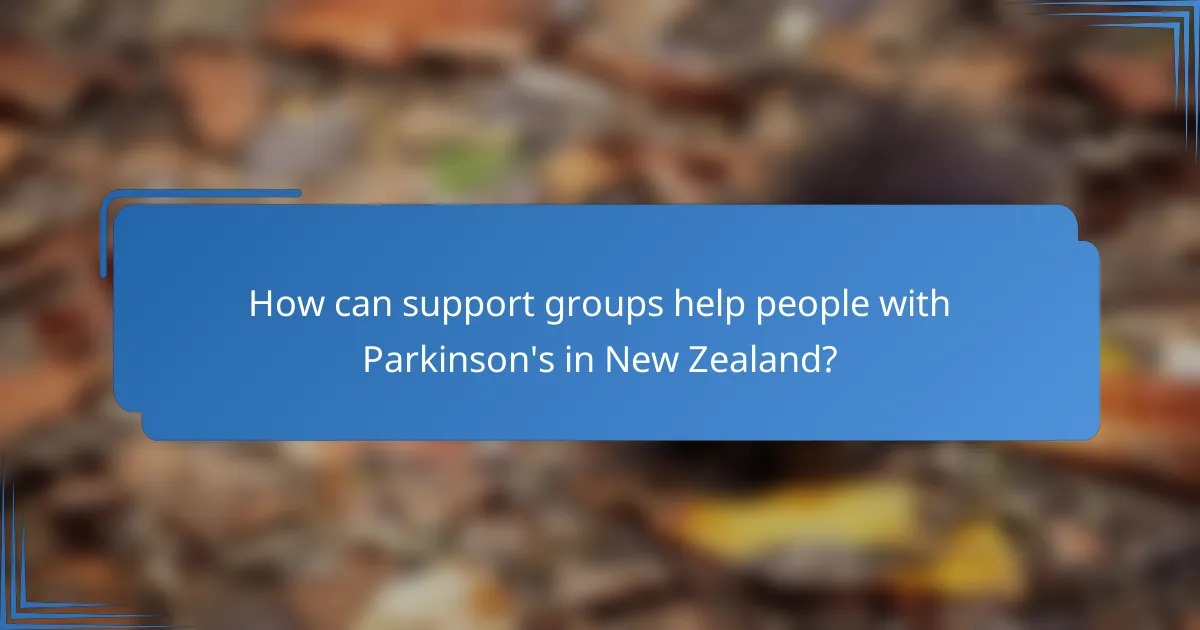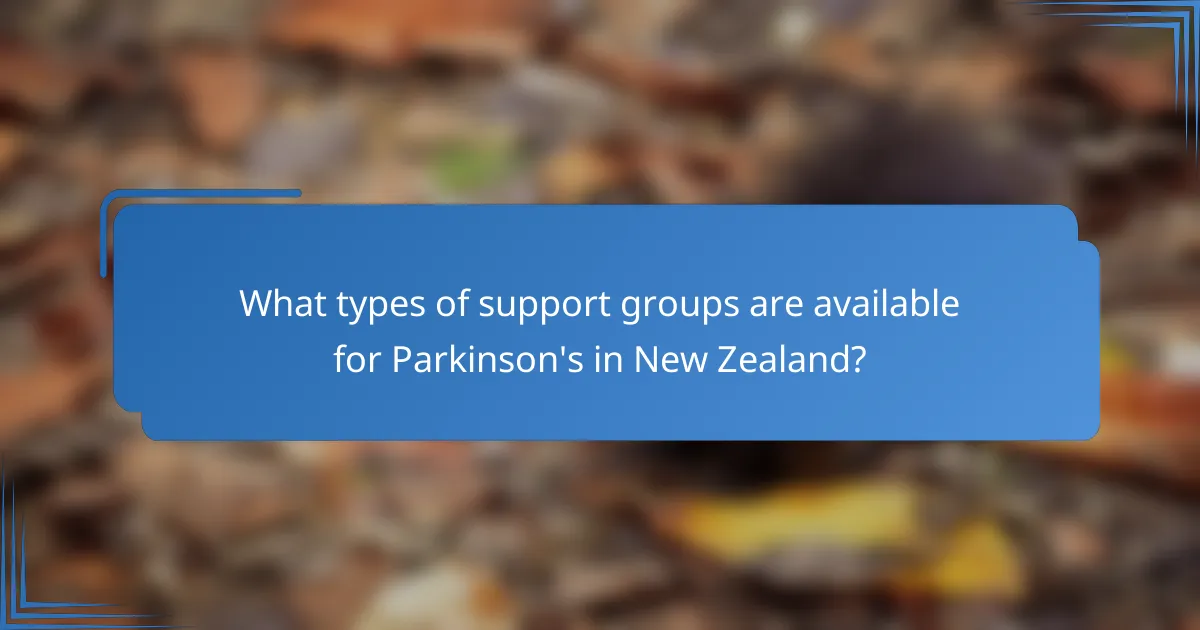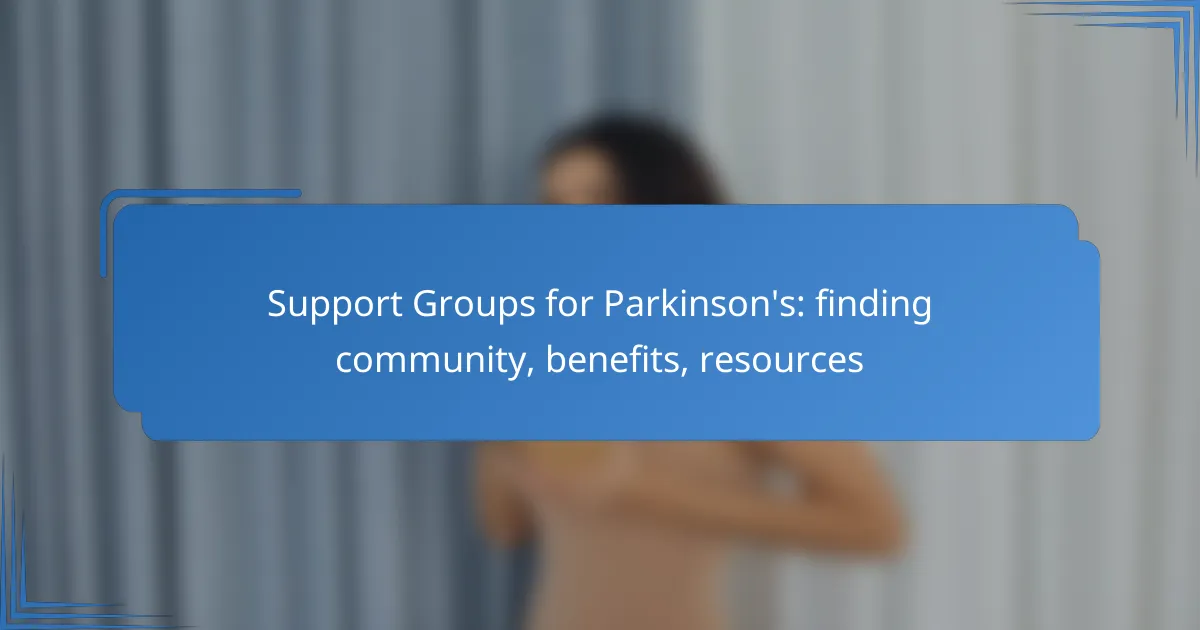Support groups for people with Parkinson’s in New Zealand offer vital community connections and emotional support, enhancing the quality of life for those affected by the condition. With a variety of local and online options available, these groups cater to diverse needs and foster shared experiences. Engaging with a support group can provide valuable resources and a sense of belonging, making the journey with Parkinson’s more manageable.

How can support groups help people with Parkinson’s in New Zealand?
Support groups for people with Parkinson’s in New Zealand provide essential community connections, emotional support, and practical resources. These groups foster understanding and shared experiences, which can significantly enhance the quality of life for individuals living with the condition.
Emotional support and understanding
Emotional support is a cornerstone of Parkinson’s support groups, offering a safe space for individuals to express their feelings and challenges. Members often share personal stories, which helps to normalize experiences and reduce feelings of isolation.
In New Zealand, many support groups are facilitated by trained leaders who understand the nuances of Parkinson’s. This guidance ensures that discussions remain constructive and supportive, allowing participants to feel heard and validated.
Sharing practical coping strategies
Support groups are valuable for exchanging practical coping strategies that can help manage daily challenges associated with Parkinson’s. Members often discuss techniques for handling symptoms, such as tremors or stiffness, and share tips on maintaining mobility and independence.
For instance, some groups may organize workshops on adaptive tools or exercises that can improve physical function. These shared insights can empower individuals to implement effective solutions in their daily lives.
Access to expert resources
Many support groups in New Zealand collaborate with healthcare professionals, providing members access to expert resources and information. This can include guest speakers, educational materials, and updates on the latest research related to Parkinson’s disease.
Additionally, support groups often serve as a hub for connecting with local services, such as physiotherapy or occupational therapy, which can enhance overall care. Members can also learn about available financial assistance programs or community services that can ease the burden of living with Parkinson’s.

What types of support groups are available for Parkinson’s in New Zealand?
In New Zealand, various support groups exist for individuals with Parkinson’s disease, catering to different needs and preferences. These groups can be local community-based, online networks, or specialized organizations focused on Parkinson’s care and support.
Local community support groups
Local community support groups provide face-to-face interaction and foster connections among individuals affected by Parkinson’s. These groups often meet regularly in community centers or hospitals, offering a safe space to share experiences and advice.
Participants can benefit from group discussions, guest speakers, and social activities, which help combat isolation. It’s advisable to check with local health services or Parkinson’s organizations for specific group locations and meeting times.
Online support networks
Online support networks offer flexibility for those who may have difficulty attending in-person meetings. These platforms allow individuals to connect from the comfort of their homes, sharing insights and encouragement through forums, social media groups, or dedicated websites.
Many online networks host virtual meetings, webinars, and chat rooms, making it easier to access information and support regardless of geographical limitations. When joining, ensure the platform is reputable and moderated for a safe experience.
Specialized Parkinson’s organizations
Specialized Parkinson’s organizations in New Zealand focus on providing resources, education, and advocacy for those affected by the condition. These organizations often offer a range of services, including information on treatment options, research updates, and access to healthcare professionals.
Examples include Parkinson’s New Zealand, which runs various programs and resources tailored to individuals and families. Engaging with these organizations can enhance understanding of Parkinson’s and provide valuable support for navigating the challenges of the disease.

How to find a Parkinson’s support group in New Zealand?
Finding a Parkinson’s support group in New Zealand can enhance your sense of community and provide valuable resources. Start by exploring local organizations and online platforms that connect individuals facing similar challenges.
Search through Parkinson’s New Zealand
Parkinson’s New Zealand is a key resource for individuals seeking support groups. Their website offers a directory of local chapters and support services across the country. You can find information on meetings, events, and resources tailored to your needs.
Consider reaching out directly to your local chapter for personalized assistance. They can provide details about upcoming gatherings and connect you with other members who share your experiences.
Utilize social media platforms
Social media can be a powerful tool for finding Parkinson’s support groups. Platforms like Facebook often host groups specifically for individuals with Parkinson’s and their caregivers. Joining these groups allows you to engage with a wider community and share insights.
When using social media, look for groups that are active and moderated to ensure a supportive environment. Engaging in discussions can help you gain knowledge and find local resources.
Contact local health services
Your local health services can be a valuable source of information for finding Parkinson’s support groups. Hospitals, clinics, and community health organizations often have connections to support networks and can guide you to appropriate resources.
Don’t hesitate to ask your healthcare provider for recommendations. They may also know of specialized programs or events in your area that cater to those living with Parkinson’s.

What are the benefits of joining a Parkinson’s support group?
Joining a Parkinson’s support group offers numerous benefits, including emotional support, shared experiences, and practical advice from others facing similar challenges. These groups foster a sense of community that can significantly enhance the quality of life for individuals living with Parkinson’s disease.
Improved mental health
Support groups can lead to improved mental health by providing a safe space for individuals to express their feelings and concerns. Sharing experiences with others who understand the emotional toll of Parkinson’s can reduce feelings of isolation and anxiety.
Regular participation in these groups has been linked to lower levels of depression and increased resilience. Members often report feeling more hopeful and empowered after engaging in discussions about coping strategies and personal stories.
Increased social engagement
Joining a support group encourages increased social engagement, which is vital for combating loneliness. Many individuals with Parkinson’s may withdraw from social activities due to mobility issues or stigma, but support groups offer a welcoming environment to connect with others.
These gatherings can also lead to friendships outside of the group, fostering a broader support network. Activities may include social outings, workshops, or group discussions that help members stay connected and engaged.
Access to educational resources
Support groups often provide access to valuable educational resources about Parkinson’s disease, including treatment options, lifestyle changes, and coping mechanisms. Members can learn from guest speakers, healthcare professionals, and shared materials that address various aspects of living with the disease.
Many groups also share information about local resources, such as physical therapy services, nutritional guidance, and community events. This access can empower individuals to make informed decisions about their health and well-being.

What should you consider when choosing a support group?
When choosing a support group for Parkinson’s, consider factors like location, group size, and facilitator qualifications. These elements can significantly impact your experience and the effectiveness of the support you receive.
Location and accessibility
Location is crucial when selecting a support group. Look for groups that are conveniently located, whether in-person or online, to ensure you can attend regularly without significant travel burdens. Accessibility features, such as wheelchair access or virtual meeting options, can also enhance participation.
Consider the frequency and timing of meetings as well. Groups that meet during evenings or weekends may be more accommodating for those with daytime commitments. Always check if the group offers remote participation, which can be beneficial for individuals with mobility challenges.
Group size and dynamics
The size of the support group can influence the level of interaction and support you receive. Smaller groups, typically ranging from 5 to 15 members, allow for more personal connections and deeper discussions. Larger groups may offer a wider variety of experiences but can sometimes feel less intimate.
Observe the group dynamics as well. A supportive and respectful atmosphere is essential for open sharing. You may want to attend a session or two before committing to gauge how members interact and whether the environment feels welcoming.
Facilitator qualifications
The qualifications of the group facilitator are vital for a productive support experience. Ideally, facilitators should have experience in mental health or social work, particularly with Parkinson’s disease. Their understanding can help guide discussions and provide valuable resources.
Inquire about the facilitator’s training and experience with Parkinson’s support groups. A well-qualified facilitator can foster a safe space for sharing and provide insights into coping strategies and community resources, enhancing the overall benefit of the group.

How do online support groups compare to in-person groups?
Online support groups offer flexibility and accessibility, while in-person groups provide face-to-face interaction and community bonding. Each format has its unique advantages and considerations that can impact the experience of participants.
Accessibility and Convenience
Online support groups are accessible from anywhere with an internet connection, making them ideal for individuals who may have mobility issues or live in remote areas. Participants can join sessions from the comfort of their homes, which can reduce travel-related stress and time commitments.
In-person groups, however, require physical attendance, which can be a barrier for some. They often have set meeting times and locations, which may not be convenient for everyone. This can limit participation, especially for those with unpredictable schedules or health challenges.
Community and Connection
In-person support groups foster a sense of community through direct human interaction, allowing participants to build deeper relationships. The non-verbal cues and emotional expressions present in face-to-face meetings can enhance understanding and empathy among members.
Conversely, online groups can connect individuals from diverse geographical locations, broadening the community experience. While the connection may feel less personal, many find that shared experiences in a virtual setting can still create strong bonds.
Privacy and Comfort
Online support groups can offer a greater sense of privacy, allowing participants to share their experiences without the pressure of being physically present. This can encourage more open discussions, especially for sensitive topics related to Parkinson’s.
In-person groups may provide a more intimate environment, which can be comforting for some. However, the fear of judgment or stigma can deter individuals from sharing openly in a physical setting.
Technology and Engagement
Online support groups rely on technology, which can be a barrier for those who are not tech-savvy. Participants need to be comfortable using video conferencing tools or chat platforms, which may require some initial learning.
In-person groups do not have this technological hurdle, allowing for straightforward engagement. However, they may lack the interactive features that online platforms can offer, such as recorded sessions or resource sharing through digital means.
